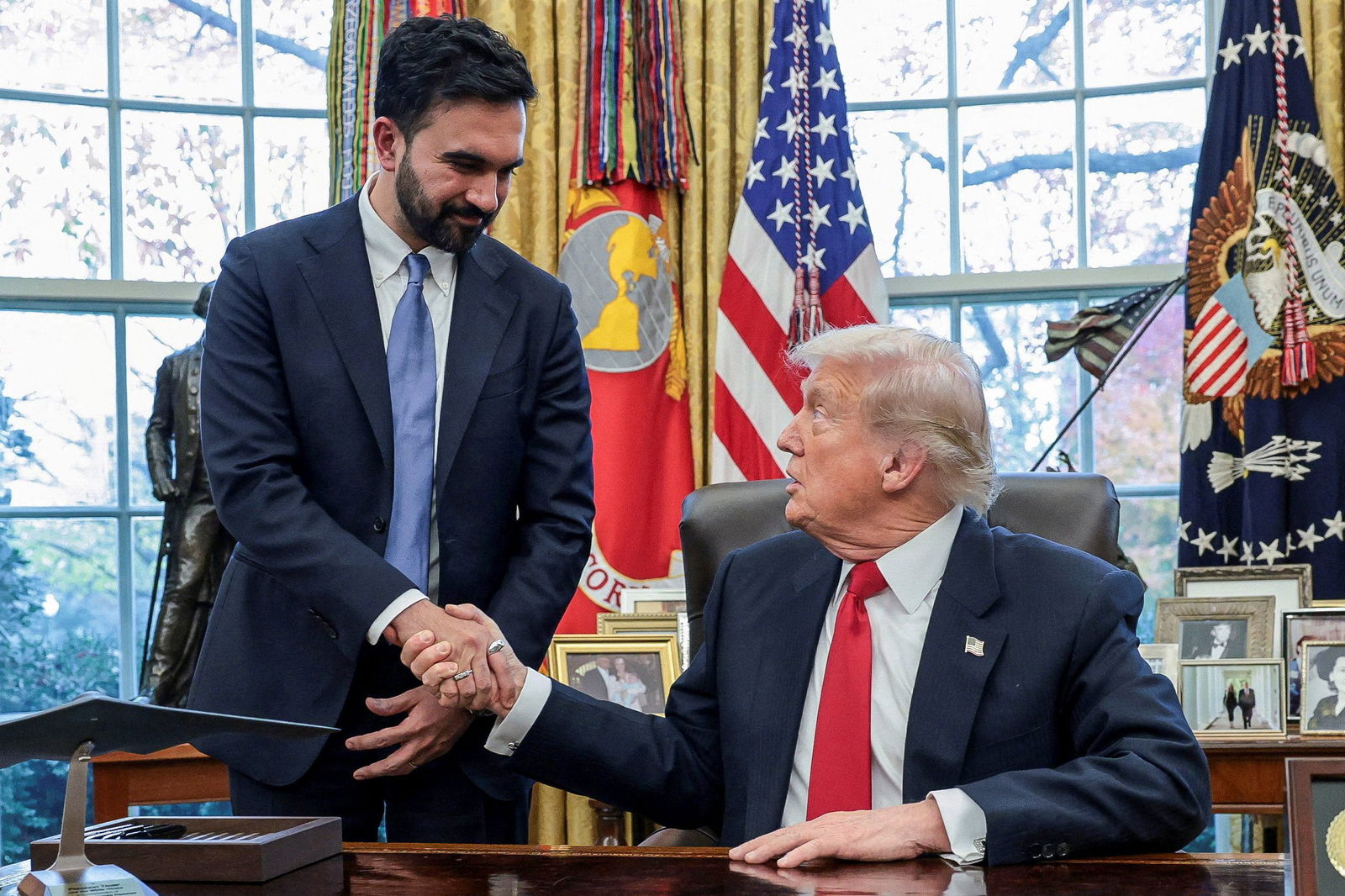Mamdani meets America’s unruly uncle: South Asians hail the special social skill that tamed Trump

President Donald Trump meets with New York City Mayor-elect Zohran Mamdani in the Oval Office on November 21
By Harmeet Kaur, CNN
(CNN) — President Donald Trump’s exceedingly warm reception of New York City Mayor-elect Zohran Mamdani at the White House last week left observers attempting to decipher what it all meant.
To longtime Trump watchers, it showed the popularity-hungry president responding to a charismatic winner; to one anti-monopolist, it showed a potential alliance between left and right populists; to a hyperlocal New York newspaper, it showed two men from Queens getting together.
To South Asians and third culture kids, the encounter showed an immigrant son of the Indian diaspora flexing a very familiar and particular skill — one likely honed over years of uncomfortable interactions with paternalistic elders.
“Desis have found Mamdani’s polite smile, respectful head tilt and general mollifying of Trump kick in a very particular muscle memory – of tactical deference to Aunties and Uncles whose lectures they actually have zero intention of obeying,” Times of India journalists opined in a recent editorial, referring to people with roots in the Indian subcontinent.
“What Zohran did was not extraordinary statesmanship or youthful rebellion but simply the oldest trick in our collective cultural book, the desi art of letting the elder talk while quietly keeping the steering wheel of our own intent,” Indian diarist Kedar Gadgil mused on LinkedIn.
“We’re disruptors, but we are managing to maintain respect for our elders. We’re learning how to play into the system that has raised us,” Yamuna Meleth, an actor and singer who was raised in Alabama by Indian immigrants, said in an interview. “I think that is Desi training.”
CNN reached out to Mamdani’s team to ask about this assessment. But whether Mamdani perfected this art as a result of his immigrant upbringing, whether it was meticulous preparation on behalf of his staff or whether he simply caught the previously hostile president in a good mood is besides the point. Fellow South Asians saw something familiar in Mamdani’s Oval Office demeanor: his uncharacteristically subdued smile, his respectful yet uncompromising tone and his deft deflections of questions intended to highlight his and Trump’s fundamental disagreements.
Meleth said Mamdani’s behavior toward Trump reminded her of fielding unsolicited advice from aunties and uncles growing up. “There is a patience that is instilled in you and a sort of acceptance, almost like you’re trained to let it go in one ear and out the other,” she added. The trick, in her experience, is “letting them gas you up and to let them think that they have something to do with your success.”
In his meeting with the president, Mamdani appeared to do just that. When asked if New York City loved Trump, he immediately pivoted to his signature message about affordability while acknowledging that New Yorkers shifted toward Trump in 2024 because of his campaign’s focus on cost of living. Trump, in turn, seemed delighted at the media’s interest in the meeting and tried to play up their perceived similarities. “Some of his ideas really are the same ideas that I have,” he said at one point. At another, “I want him to do a great job, and we’ll help him do a great job.”
As Mamdani faced criticism from some on the left for meeting with Trump, others praised what they saw as the mayor-elect’s ability to disarm a notoriously contentious figure without getting defensive or compromising his values. In doing so, he undercut the right’s attempt to paint him as a communist jihadist and tamped down fears of the National Guard being deployed to New York City — at least for now.
Gadgil likened this ability to a dance that South Asians are especially practiced in. “Eventually you start leading without the other person realizing that you were following just a moment ago,” he said. “To an outsider, it looks like a very choreographed piece.”
Afshana Haque, a Houston-based therapist who specializes in South Asian clients, characterized Mamdani’s dynamic with Trump as “very similar to how we navigate maybe aunties at a party telling us about who to marry and what color their skin should be and what career to have, and yet being polite about it.”
While Western societies tend to favor clear, direct communication, Haque said non-Western cultures often view such explicitness as disrespectful, meaning people with roots in those cultures learn to strike a delicate balance between appeasing a difficult elder and staying true to oneself.
“Growing up, for many of us, it was very upsetting, annoying, frustrating that we even had to do that. It takes a lot of mental energy and emotional energy at times,” Haque said. “But what is so beautiful about all of this is seeing how these can be strengths for us and can help us navigate worlds.”
Mamdani’s charm offensive on Trump was notable considering the confrontational turns that the president’s meetings with other high-profile leaders have taken. In February, Ukrainian President Volodymyr Zelensky’s White House visit escalated into a shouting match, with Trump and Vice President JD Vance chiding him for not being sufficiently grateful for US support in the country’s war against Russia. South African President Cyril Ramaphosa’s Oval Office appearance in May ended in a similar ambush as Trump tried to falsely accuse him of enabling white genocide.
One way of understanding all of these interactions might be that Trump is acting in his own political interest, and that striking a friendly tone with Mamdani last week was the most advantageous maneuver at the time.
But for many South Asian observers, the uncle disarmament strategy is not to be dismissed.
The-CNN-Wire
™ & © 2025 Cable News Network, Inc., a Warner Bros. Discovery Company. All rights reserved.



